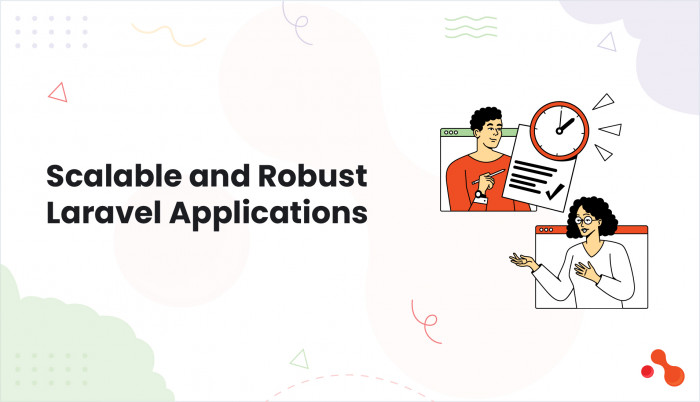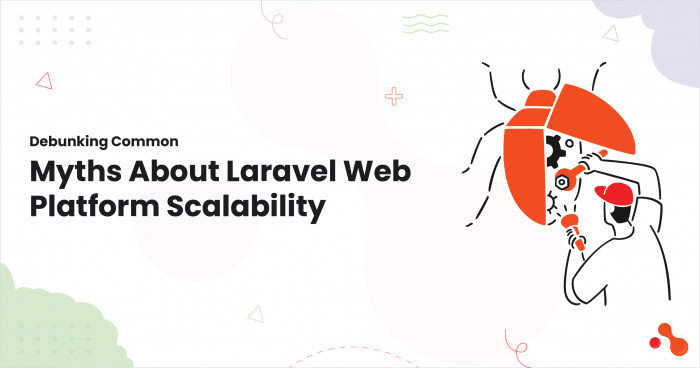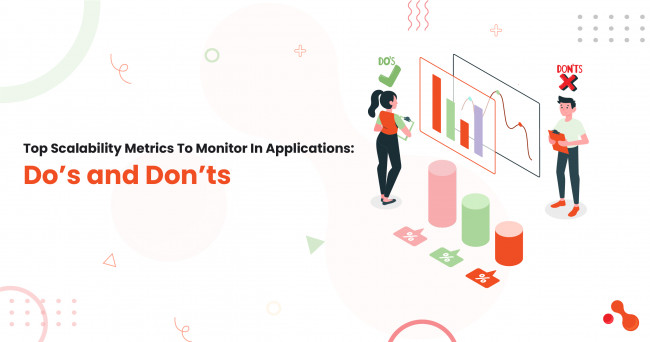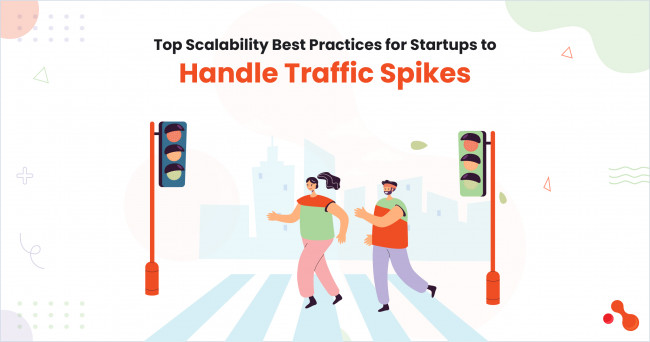Introduction
Scalability is a framework's ability to support growth. This can be in terms of user traffic, data processing, or feature expansion. With the right tools, practices, and architecture, Laravel can scale to support demanding applications. Almost all applications need to be scaled at some point.
This includes applications like eCommerce websites as well as social media platforms. Laravel is the ideal framework for developing highly scalable and robust solutions. However, several myths hinder the development of a state-of-the-art solution. It is best to take advantage of the Laravel development services of expert firms to gain an upper edge.
Here’s a deep dive into how to debunk myths about Laravel scalability.
Scalable and Robust Laravel Applications
Creating a scalable and robust Laravel application involves leveraging the framework’s tools, design principles, and best practices to ensure high performance, adaptability, and resilience.
Trust a professional Laravel development company to build a robust solution.
Acquaint Softtech is one such software development outsourcing company with over 10 years of experience. We have already successfully launched 5000 projects world wide.
Building a scalable and robust Laravel application involves a combination of best practices, efficient resource management, and a forward-thinking architecture. From optimizing database queries to implementing serverless functions, Laravel’s ecosystem is equipped to handle high-performance applications.
With tools like Octane, Telescope, and Horizon, along with external solutions like CDNs and cloud services, Laravel is capable of powering applications that scale reliably and efficiently.
Debunking Common Myths On Laravel Scalability

Laravel, with its elegant syntax and comprehensive ecosystem, has earned its place as one of the most popular PHP frameworks. However, as with any widely-used technology, there are misconceptions about its capabilities, particularly concerning scalability. It is best to hire Laravel developers from a well-established firm to ensure it does not affect your project.
Here are some of the myths On Laravel scalability:
Laravel Isn’t Built for Large-Scale Applications:
One common myth is that Laravel is only suited for small to medium-sized applications. However, Laravel is more than capable of handling large-scale projects with the right architectural setup. With tools like Redis for caching, job queues, and Laravel Octane for performance boosts, Laravel can scale to support thousands of concurrent users. For instance, Laravel’s caching capabilities allow applications to serve frequently requested data without repeatedly querying the database, effectively supporting larger user loads.
Laravel Performance Decreases Under Heavy Traffic
There’s a misconception that Laravel’s performance cannot withstand heavy traffic. In reality, Laravel can handle high volumes of traffic through efficient caching, database optimization, and load balancing. When combined with a CDN, content can be served quickly to users across the globe, reducing server load. With proper optimization strategies, Laravel applications can deliver fast response times even as user traffic increases.
Laravel Isn’t Suitable for Real-Time Applications
Some believe Laravel isn't equipped to handle real-time applications like chat platforms, notifications, or live data updates. However, Laravel’s broadcasting capabilities and integration with services like WebSockets and Pusher enable it to manage real-time functionalities efficiently. Laravel Echo, along with tools like Laravel WebSockets, can support real-time updates for applications without sacrificing performance or reliability.
Scaling Laravel Requires Extensive Development Effort
Many assume that scaling a Laravel application involves significant manual effort. However, Laravel offers a robust suite of tools that make scaling easier. Laravel Horizon, for instance, provides a UI to manage queues effectively, and Laravel Octane enhances performance by allowing applications to handle more requests per second. These tools streamline the scaling process, reducing the time and resources required to support growing traffic.
Database Scaling is a Challenge in Laravel
Database scaling is often seen as a hurdle in Laravel. However, Laravel offers native support for multiple database connections, allowing for horizontal scaling. Developers can implement read/write splitting to distribute database loads or integrate with NoSQL databases like MongoDB. Using tools like Redis as a cache layer further optimizes database interactions, ensuring applications run smoothly even with substantial data loads.
Laravel’s Monolithic Structure Limits Flexibility
Laravel is sometimes labeled as a "monolithic" framework, which may imply limited scalability. However, Laravel applications can be organized modularly and deployed within microservices architectures. With containerization tools like Docker and orchestration platforms like Kubernetes, Laravel services can be scaled independently, allowing for flexible deployment and management of each component.
Laravel Scaling Isn’t Cost-Effective
A common misconception is that scaling Laravel is costly. Laravel integrates seamlessly with cloud providers such as AWS, Google Cloud, and DigitalOcean, making it affordable to scale applications as they grow. By using serverless options, managed databases, and load balancers, Laravel applications can scale efficiently without a significant cost increase. Laravel’s ability to integrate open-source tools for caching, queuing, and load balancing further enhances cost-effectiveness.
Hire remote developers from a professional firm like Acquaint Softtech. We happen to be an official Laravel Partner, one of the few in Asia and India. Our highly talented pool of developers have the expertise to deliver top-notch solutions and debunk the myths.
Conclusion
Laravel’s ecosystem provides powerful tools and flexibility for handling both small and large-scale applications. While myths on Laravel scalability persist, they often stem from misunderstandings about Laravel’s extensive capabilities and optimization techniques.
With the right approach, Laravel can indeed support robust, web platforms capable of accommodating growth and heavy user traffic. This makes it ideal for a scalable and robust Laravel application.
Laravel is a good choice for scalable applications when optimized correctly, making it suitable for startups and enterprises alike.
FAQ
Is Laravel capable of handling high-traffic applications?
Yes, Laravel can handle high-traffic applications with the right configurations. Techniques like caching, database optimization, and load balancing can help Laravel perform effectively at scale.
Is Laravel too slow for large applications?
Laravel’s perceived slowness often comes from inefficient code or configuration, not the framework itself. Optimizing queries, using caching, and leveraging Laravel's built-in optimization tools can significantly enhance performance.
Can Laravel support enterprise-level growth?
Absolutely! Laravel’s modular architecture and strong ecosystem support complex applications. With the right infrastructure and best practices, Laravel can handle enterprise demands and sustained user growth.
Does Laravel lack scalability compared to other frameworks?
Laravel is scalable when deployed with appropriate tools and resources. By using horizontal scaling, load balancers, and cloud infrastructure, Laravel can match the scalability of other popular frameworks.
What are the best practices to make Laravel applications scalable?
Key practices include database optimization, using Redis or Memcached for caching, utilizing job queues, optimizing queries, and leveraging cloud solutions for distributed systems.
















